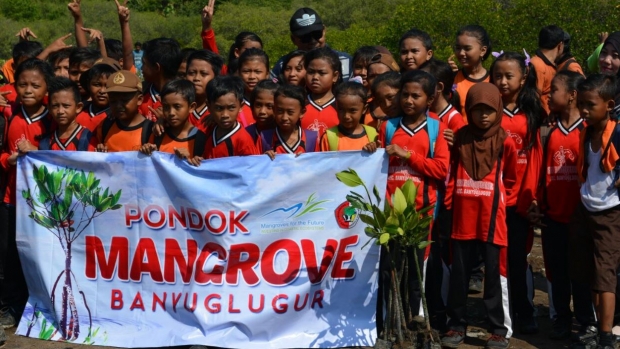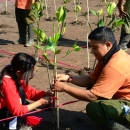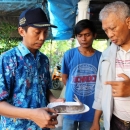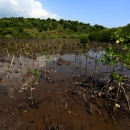Grants :: Small Grant Facilities :: Mangrove Education as a Basis of Ecological and Economic Resilience of Community at Banyuglugur Village
Mangrove Education as a Basis of Ecological and Economic Resilience of Community at Banyuglugur Village

The 5th graders of Banyuglugur Elementary School taking part ... , Banyuglugur village, Situbondo, East Java © P3M UNTAG, 2016
Objectives
The project objective is to strengthen capacity of coastal dependent communities in mangrove areas through education, public awareness, mangrove rehabilitation and livelihood activities.
Background
Banyuglugur, a village located in the coastal area of Situbondo, is suffering from environmental degradation. The ongoing sea abrasion in the coastal area has diminished some of the inland areas, including Banyuglugur village. Lack of understanding on the importance of coastal ecosystems was identified as the main problem. Seeking to solve this issue, the Research Centre and Community Service University (PPPM-UNTAG) together with the local community was determined to improve the awareness of local people about mangrove ecosystem functions and stressed that planting mangroves in degraded areas was not the only option that could be done. It is also important to deepen the understanding of people, starting from children in elementary schools, on the importance of mangroves and mangrove ecosystems for nature and people. PPPM-UNTAG under the Mangroves For the Future Small Grant Facility (MFF-SGF) project builds public awareness on mangroves and strengthens economic resilience through income generating programmes. The activities include planting mangroves, providing mangrove references for the school library, developing educational materials on mangroves for elementary students, and providing training on livelihood activities for women groups.
Target beneficiaries
The income generating activities were designed to benefit the 8 members (formerly 15 members) of the Karyawanita women's group from Banyuglugur. This women's group is considered to have an enormous potential to increase their daily income which is approximately IDR 50,000 (approx US$ 3.83) or even more. The project aims to improve the women's skills in utilizing mangrove ecosystem resources, which will result in better income generation. Approximately 100 elementary students in Banyuglugur Village also received education on the function of mangrove ecosystems.
Outputs
The project was conducted at village and district level and has received positive feedback from both the local government and other stakeholders. The Regent of Situbondo has stipulated a letter to support the SGF implementation in Banyuglugur Village.
Approximately 20 people, both men and women, were educated about the importance of mangrove ecosystems and the benefits of mangrove for nature and people. Communities in the surrounding coastal area of Banyuglugur that were affected by sea abrasion were also educated. 50 elementary students were also introduced to mangrove ecosystems and educated about their benefits. A school library in Banyuglugur Elementary school had been set up, along with mangrove references for the library.
More than 1,000 mangrove seedlings were planted in 0,25 ha area of Perhutani (Indonesian Forest Enterprise) by involving around 100 students and teachers of Banyuglugur Elementary school. Each student planted 10 mangrove seedlings. 
In terms of empowerment program, the PPPM-UNTAG had facilitated the establishment of the Karyawanita women's group. 15 women participated in financial and organisation skills management training as well as training on the production of fish crackers. The women's group had been producing and marketing fish crackers at local markets. To support product marketing, PPPM-UNTAG facilitated the group to obtain Produk/Pangan Industri Rumah Tangga (PIRT), a license for household production from Public Health Office. The group had received full support from the Chief of Banyuglugur village. The women's group had also been registered at the Ministry of Justice and Human Rights for legal status.
The economic activities of Karyawanita group has attracted private sector, one of the big companies within the area. Through its Corporate Social Responsibility (CSR), the company intends to continue supporting their activities following the end of MFF project period. The supporting letter from the company has been endorsed during the MFF project period.
 |
 |
Accomplishments and challenges
 |
Contributions to cross-cutting themes
Climate change
By planting more than 1.000 mangrove seedlings, carbon will be sequestered. The project does have an impact on mitigation action to combat climate change.
Gender equality
In relation with gender issue, this project had considered gender in the first place and it was reflected in project activities. Project socialization engaged 75% women and 25% men. In income generation programme, communities members are 100% women. In addition, the involvement of male and female students in mangrove planting was fairly balanced.
Lessons Learned
- Clarity of land status is the minimum requirement for long-term activities such as mangrove planting/rehabilitation. Planting on public land needs to be equipped with written agreement from the relevant authorities so that the plants should not be cut down or claimed by other party, and the status of land use will not change.
Project Facts
Country
Location
Banyuglugur village, Situbondo, East Java
Topic
Duration
2nd Mar 2016 to 31st Dec 2016
MFF Grant Amount
IDR 130,000,000
Co-financing Partner
In kind from others IDR 27,515,000 (USD 2,255)
In kind from Grantee IDR 12,500,000 (USD 1,024)
Implementing Partner
PPPM UNTAG
Jl. Adisucipto No. 26 Taman Baru Village, Banyuwangi-East Java


